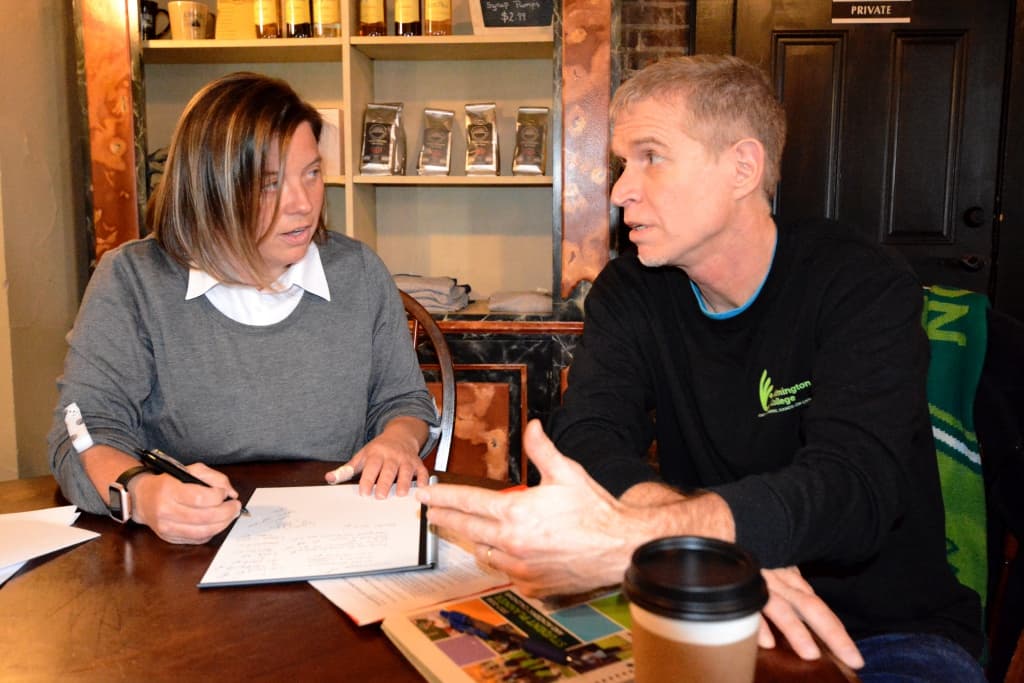New Academic Area Established Largely in Response to Popular Washington Lobby Trips
Long gone are the days when American agriculture could be summed up simply as “plows, cows and sows.”
Even if that were ever the case, food production in the 21st century has become both a science and a social science with implications that resonate throughout American society, as well as the global economy, geo-politics and even carry a logical relationship for war and peace.
PICTURED: WC faculty members Corey Cockerill and Michael Snarr discuss the new food policy and agriculture advocacy concentration during an off-campus meeting at the popular Kava Haus in Wilmington.
Dr. Monte Anderson, professor of agriculture, is fond of telling his students, “If you don’t get involved with the decision-making, those decisions will be made for you.”
Enter Wilmington College’s newest major concentration: food policy and agriculture advocacy, which, starting in fall 2018, will be an academic concentration under political science. Its establishment is an extension of WC’s largest major, agriculture, and came largely as a result of one of Wilmington College’s signature hands-on learning opportunities.
Indeed, so many agriculture students became interested in WC’s spring lobbying experience in Washington, D.C., that the College began offering two agriculture-focused lobby trips in recent fall semesters. Currently, 25 percent of the College’s 350 agriculture majors have engaged in this unique experience, some multiple times.
Dr. Michael Snarr, professor of political science and long-time lobby trip facilitator, said the experience profoundly affects students and their career ambitions. “I can’t tell you how many times, at the end of the lobby trip, students have come up to me and asked, ‘How can I pursue this further? Can I study this?’
“They’re doing something they never dreamed they would do — they feel emboldened and empowered,” he said about students’ newly found voice with elected legislators, governmental staff and major stakeholders at the centers of power, all of which hire interns and employees with backgrounds and interests in agriculture policy. “Also, these experiences really build networking and resume bullets.”
Dr. Corey Cockerill, associate professor of communication arts and agriculture, said a number of students recently have been creating their own majors with a focus on the areas of food policy and agriculture advocacy, so the College pursued crafting this academic area as a stand alone concentration that also would complement other majors or even a minor in agriculture.
“Our agriculture students realize what is happening at the farm level is significantly impacted by what’s done at the state and federal levels,” she said. “They realize they should be part of that process.”
She said many persons associated with agriculture don’t know what’s included in the federal Farm Bill that gets renewed every five years, yet its contents are felt throughout the industry and beyond.
Cockerill lauded the College’s hands-on learning opportunities as making students — especially those pursuing areas of agriculture — both more knowledgeable and marketable. Through internships and field experiences, students are exposed to both governmental and non-governmental entities, political action and trade organizations, the Farm Bureau, U.S. Dept. of Agriculture, etc.
“Wilmington College is dedicated to hands-on learning and these engaging opportunities represent our strong suit,” she added. “We blow it out of the water in terms of engagement.”
Some of the core courses in the concentration include Agriculture Policy, Global Politics of Food, Environmental Law and Policy, Agriculture Communication and a political advocacy practicum.

College Starting Concentration in Food Policy and Agriculture Advocacy
Agriculture|Political Science